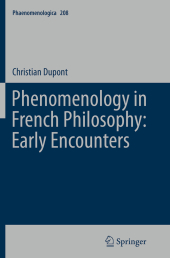 Neuerscheinungen 2016Stand: 2020-02-01 |
Schnellsuche
ISBN/Stichwort/Autor
|
Herderstraße 10
10625 Berlin
Tel.: 030 315 714 16
Fax 030 315 714 14
info@buchspektrum.de |

Christian Dupont
Phenomenology in French Philosophy: Early Encounters
Softcover reprint of the original 1st ed. 2014. 2016. xi, 338 S. 235 mm
Verlag/Jahr: SPRINGER NETHERLANDS; SPRINGER 2016
ISBN: 9402400060 (9402400060)
Neue ISBN: 978-9402400069 (9789402400069)
Preis und Lieferzeit: Bitte klicken
This book examines the reception of the phenomenological philosophy of Edmund Husserl in France, probing the reponses of philosophers and religious thinkers of the day, and showing how these developed differently based on the influence of Bergson and Blondel.
This work investigates the early encounters of French philosophers and religious thinkers with the phenomenological philosophy of Edmund Husserl. Following an introductory chapter addressing context and methodology, Chapter 2 argues that Henri Bergson´s insights into lived duration and intuition and Maurice Blondel´s genetic description of action functioned as essential precursors to the French reception of phenomenology. Chapter 3 details the presentations of Husserl and his followers by three successive pairs of French academic philosophers: Léon No‰l and Victor Delbos, Lev Shestov and Jean Hering, and Bernard Groethuysen and Georges Gurvitch. Chapter 4 then explores the appropriation of Bergsonian and Blondelian phenomenological insights by Catholic theologians Édouard Le Roy and Pierre Rousselot. Chapter 5 examines applications and critiques of phenomenology by French religious philosophers, including Jean Hering, Joseph Maréchal, and neo-Thomists like Jacques Maritain. A concluding chapter expounds the principal finding that philosophical and theological receptions of phenomenology in France prior to 1939 proceeded independently due to differences in how Bergson and Blondel were perceived by French philosophers and religious thinkers and their respective orientations to the Cartesian and Aristotelian/Thomist intellectual traditions.
From the reviews:
"Dupont´s book is a clear and readable account of a complex moment, and can serve as an introduction to French philosophy more generally in the first half of the twentieth century. It provides accessible surveys of the work of a number of important thinkers within and outside of the phenomenological tradition ... . The book will thus be an aid for scholars, and it is written so that readers can dip in and read individual sections depending on their interest." (Edward Baring, Notre Dame Philosophical Reviews, ndpr.nd.edu, 2014)


